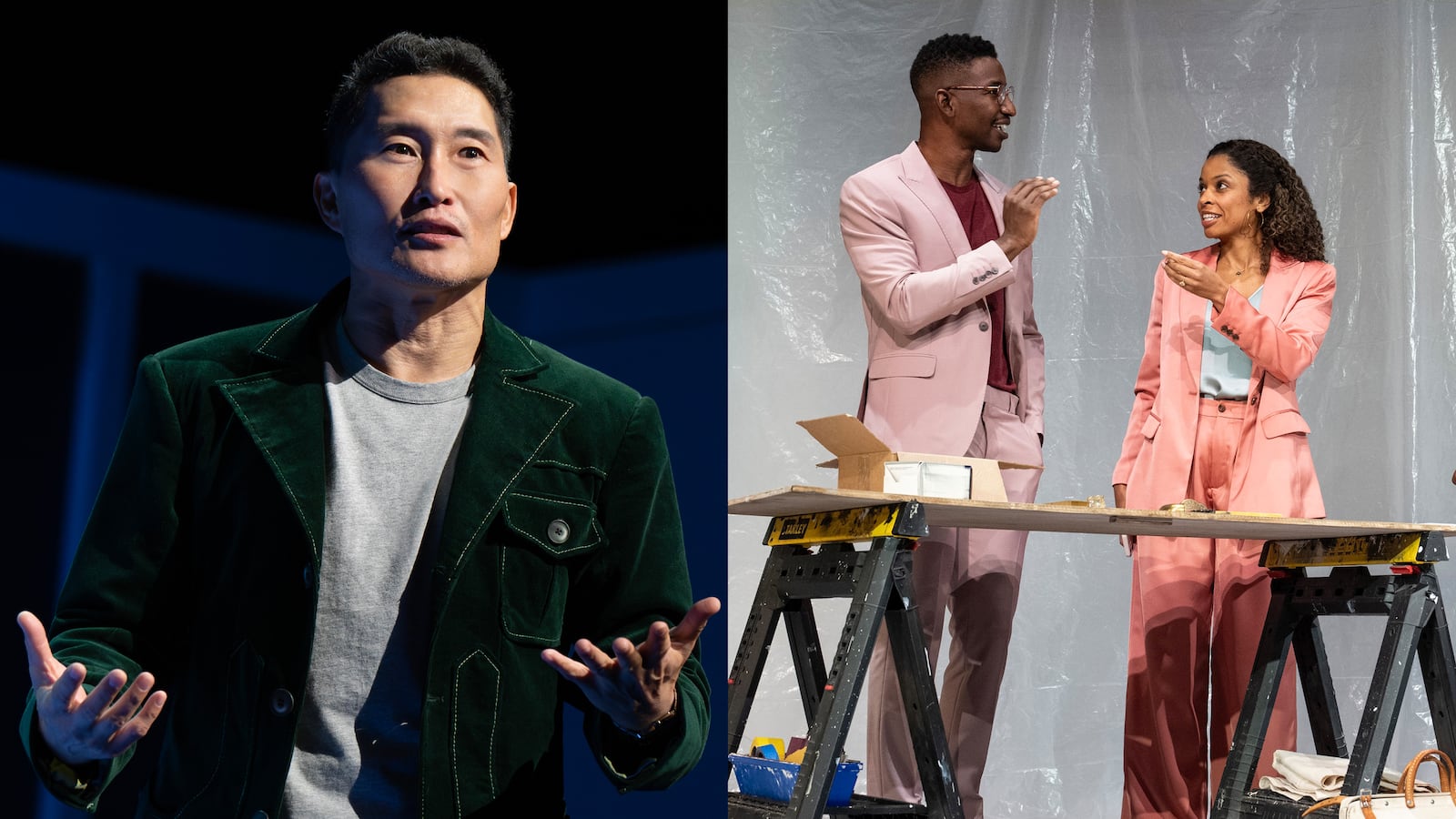There are four very good actors on stage in James Ijames’ excellent play, Good Bones (Public Theater, to Oct. 27)—but the star of the show is the kitchen that gradually reveals itself to the audience from behind protective sheets. It is the soft grey, blandly, suffocatingly chic centerpiece of a home renovation of a well-off Black couple, Aisha (This Is Us’ Susan Kelechi Watson) and Travis (Mamoudou Athie).
That renovation is being efficiently masterminded by Black contractor Earl (Khris Davis), who soon forms a connection with Aisha as they grew up in the same housing project. Later, his sister Carmen (Téa Guarino) will join him to finish the last of the painting, and add another perspective to Ijames’ thoughtful, provocative writing.
Less raucous than Ijames’ Fat Ham, which won the Pulitzer Prize for Drama and went from the Public Theater to Broadway, Good Bones features meditations on wealth, class, identity, and belonging, accompanied by the sound of an unquiet spirit. In both Fat Ham and Good Bones tensions are offset by the self-expressive joys of dance.
What seems like a lovely link to a shared past between Earl and Aisha becomes more complex and testy when it is revealed that Aisha is helping spearhead a major gentrification development—a sporting arena—in the area. The lovely house that Aisha and Travis live in, and the restaurant where Travis is a chef, are other examples of such gentrification, but Earl is uneasy—and eventually angry—at Aisha’s lack of sensitivity to the change she is responsible for, the upheaval to people’s lives, and the fraying of community bonds and history, the implacable inaccessibility, that shiny new buildings herald.

(l to r): Mamoudou Athie, Téa Guarino, Khris Davis, and Susan Kelechi Watson in 'Good Bones.'
Joan MarcusAisha makes an opposing, and just as keenly felt argument—that the past should not be romanticized; that she had been bullied in this neighborhood, that her family had grown up in desperate circumstances; that change and innovation can bring new life to a neighborhood that needs it. Travis just wants to sleep, but loud music outside is stopping him—so he calls a number provided to deal with noise complaints. This leads to more conflict.
Throughout, we hear a ghostly gurgling laughter; a toy is thrown mysteriously down stairs. We know that Earl played there as a little boy, when it was owned by a beloved teacher. Is it her spirit? Is it a happy spirit, or angry one? Is it a ghost at all? All the time the sheets of the renovation are slowly removed revealing the entirety of Maruti Evans’ kitchen, which Earl criticizes in it all its expensive plainness as symptomatic of all that is wrong with what Aisha represents.

(l to r) Khris Davis, Susan Kelechi Watson, and Téa Guarino in 'Good Bones.'
Joan MarcusThis central clash of beliefs is also laced with humor. Travis seems perennially happy and full of beans—but is this a symptom of coming from wealth? Earl may be angry at Aisha’s lack of engagement, but he is also very particular that she chooses the most expensive fittings for the cabinetry. Although he doesn’t want to attend a dinner party at the end of the project at Aisha and Travis’ when Earl does he is fill-my-plate-again happy to feast on the delicious barbecued goat that Travis has prepared.
Ijames and director Saheem Ali craft believable confrontations, in which characters not only give each other the space to have their say, but do not go so nuclear so as to reject each other, slam doors, and mutter threats when things do not go their way. Also sensitively traced, and not fatal, are the fault lines within Aisha and Travis’ marriage. The questions that Kelechi Watson and Athie skillfully show them both facing: who are they, where are they?
The play doesn’t come down on one side of the gentrification debate or another, but neither does it both-sides the issue. It remains rooted in character, and its conflicts are played out in good faith; its piercing ending is, in miniature, a nudge for us all to reject fear and open our doors and minds, and, most importantly, to fully live in the communities where we live.

l to r: Francis Jue and Daniel Dae Kim in 'Yellow Face.'
Joan MarcusIn the Roundabout Theatre Company production of Yellow Face on Broadway (Todd Haimes Theatre, to Nov. 24), Daniel Dae Kim plays ‘DHH,’ a distillation of multi-award winning playwright David Henry Hwang, whose play is a witty, damning analysis and exposure of racism as reflected in the casting of white actors in Asian roles.
This play is partly rooted in reality, partly not. Hwang really did help spearhead the protests in 1990 when it was announced that Jonathan Pryce would be taking on the Eurasian role of the Engineer in Miss Saigon on Broadway—and the play conveys both why he felt so strongly as well as the personal upheaval endured when one becomes a figurehead of protests.
Lost and Hawaii Five-O star Kim plays DHH as a committed advocate, solidly dedicated to the fight but also one who feels put-upon in that position. He would rather deploy his wit on the page than wave placards in public, but needs must. Kevin del Aguila, Francis Jue, Marinda Anderson, and Shannon Tyo all excel as a dizzying multiplicity of characters, crossing genders and skin colors, who either support Hwang or are opposed to him.

l to r: Francis Jue, Marinda Anderson, Kevin Del Aguila, Daniel Dae Kim, Ryan Eggold, and Shannon Tyo in 'Yellow Face.'
Joan MarcusThe other component of Yellow Face, directed by Leigh Silverman, sees Hwang—who before this controversy had written M. Butterfly (a finalist for the 1989 Pulitzer Prize for Drama)—decide to write his own play, Face Value, about the Miss Saigon controversy. That was staged in 1993.
In the Face Value we see dramatized in Yellow Face DHH hires an actor called Marcus G. Dahlman (Ryan Eggold), who looks extremely white to us—like really absurdly white—but who Hwang convinces himself is in fact Asian. The comedy of the play—which feels more like a sequence of sketches—is of the Frankenstein kind, because Marcus becomes his own kind of monster, a white actor preaching about racial equity and understanding, even though he is white.
Hwang, like the rest of us, watches in utter exasperation as Marcus—and Eggold plays him as a truly blank canvas—co-opts Asian identity for his own ends. It is both funny, and galling. A third storyline, about Hwang’s father, a business scandal, and what Hwang considers to be the New York Times’ racist-based reporting of the scandal, is less successfully sketched—when Marcus gets involved in it it feels really forced and scrambled—despite a tense and well-acted centerpiece confrontation between Hwang and an unnamed NYT reporter, played with flinty assurance by Greg Keller.
The end of the play, mirroring the just-opened McNeal starring Robert Downey Jr., throws us into the territory of slippery authorial identity—and the reality and truth of the voices and various real and now-revealed-as-fake dramas we have been watching.
This closing cavalcade of gotchas somewhat dilutes the potency of what has gone before. But perhaps the real power Yellow Face proposes is of minority voices not just delivering sober-minded rebuttals to bigotry, but—in occupying spaces like a Broadway theater—offering those rebuttals with irreverent humor and pointed swagger while playing with audiences’ perceptions and expectations as freely as possible.







